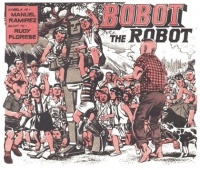
My grandmother (God bless her soul) went on fairly regular trips to other countries for a Catholic charity while I was growing up and never failed to bring me back a comic book. Of course most of the time I couldn’t read them (though I have indelible memories of one, a British boys weekly, that had a trio of boys fighting the Nazis from the seats of their proto-BMX bikes), but I treasured them all the same. Besides being proof positive that a world existed outside of Akron, Ohio, they were evidence that comic books were being published all over the world; even if I’d never get to read them:
So I was more than ready when during the ‘80s manga finally made their way to
That kind of diversity seems like an impossible dream these days, so I suppose I should be happy with Marvel’s deal with the French publisher Soleil. But I’m afraid my worst fears were confirmed when I got my copy of the Soleil Sampler they published last week. It’s a nice little booklet featuring previews of the upcoming titles Sky Doll, Universal War One, Samurai, and Scourge of the Gods, and interviews with their creators. Marvel did something similar for their fiction line and I suppose the thinking is with little cost and less effort the European reprints might turn into a nice little niche line for the company.
I don’t want to be negative. I certainly don’t mean to be, but as I predicted in a previous column (see “Confessions of a Comic Book Guy--To The Good”), Marvel has done the worst thing they could do with the material--they’re trying to do it on the cheap, repeating the mistakes publishers made in the ‘80s. Like squishing the art to confirm to American standards, using an accurate but clumsy English translation (when an American one is needed) and, finally, not springing for new American style lettering.
I hope I’m wrong; I frequently am. And though I know this is the wrong way of going about adapting European comics for the American market, I really don’t know what the right one is (if there is one). Lots of people have tried publishing them in their traditional album format with just as little success. I wish Marvel luck. Maybe it’s “time” for European comics in
I’ve signed up for any number of RSS (Really Simple Syndication, like I have to tell any of you) feeds to keep me informed as I work online, and just as I was putting together this column I got an e-mail with the come-on: “Comic book action heroes may be better weapons against terror than bullets or bombs.”
It was a Newsweek Web-exclusive piece written by Christopher Dickey called “Jihadi Cool” about anthropologist Scott Atran, who’s studied the kids who are the prime recruit targets for terrorists. His conclusion; the best chance for saving them is a) discrediting their terrorist role models and b) giving them alternatives. So Atran went to Homeland Security armed with copies of The 99 from Teshkeel Comics.
It’s fascinating, and if you’ve never read a copy of The 99 you can go to the Teshkeel Website and download a free copy of The 99 Origins. If nothing else, it shows there are people who still think that superheroes can be positive role models and can send positive messages.
I only wish some of them actually worked in the comic book industry.
*What I haven’t seen but would dearly love to is translations of comics from the
The opinions expressed in this Talk Back article are solely those of the writer, and do not necessarily reflect the views of the editorial staff of ICv2.com.


